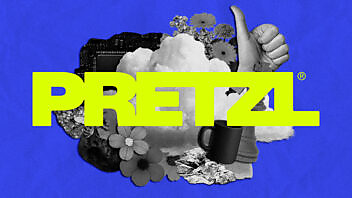In case you missed it due to Mars-based travel plans, Mark Schaeffer dropped a bomb on the content marketing world a few days ago with his post Content Shock: Why Content Marketing Is Not A Sustainable Strategy.
I wouldn’t have thought it was still a contentious argument: as we approach content saturation, content marketing will get harder and harder until, for many, it stops working. It’s the argument we make in our Crap slideshare and elsewhere.
But I was wrong.
The post unleashed all the hounds of content marketing and created a deafening din of more-or-less-screechy feedback that’s still rocking the collective CM echo chamber.
Maybe it’s the provocative headline or the reference to economics and the cool chart. But this one hit a nerve.
Why is the Content Shock concept so scary?
Because millions of marketers are stampeding towards the best party marketing has seen since the internet — only to find some guy saying ‘The party’s over’.
The party isn’t over. (And I don’t think Mark is actually saying that).
It’s just that now there are two big bouncers at the door (One has a tattoo that says Google. So does the other one.) And the room is over-crowded. And the music is not only too loud, it’s coming from 94 different bands.
We’ve been saying this for a while:
When content marketing goes mainstream, it stops conferring advantage.
It confers benefits, but – when every competitor is doing it too – it only generates advantage if you’re way, way better at it (which is our advice, by the way).
Today, content marketing is becoming the price of entry into a market. Like having a website. It doesn’t win the race but it gets you to the starting line.
That doesn’t mean we can stop. In fact, we have to get better and better at it.
But it does mean we need to start thinking about the next source of advantage.
For most B2B marketers, we’re not at Mark’s dreaded saturation point yet. In fact, I don’t think we’re even close. Because content isn’t one big ocean, it’s a million little puddles & pools, each addressing a specific issue for a specific audience.
It’s like a fractal: the closer you look, the more detail is there.
Content is getting more and more granular and granularity creates relevance. This trend will continue as we learn to segment our world better, personalise our content and make it context-sensitive. [See this post on content granularity for a bit more on this.]
Just as TV naturally evolved towards narrowcasting, content will get more and more targeted.
One day, every one of your competitors may be producing a firehose of fresh, fantastic, super-targeted content mapped to a tight funnel and managed by smart lead nurturing robots. But that day is years away.
The bad news: Mark is right: The Saturation is coming.
The good news: Most marketers will still suck at this for many years.
Being good at it is still a really, really good strategy.

Enjoyed this article?
Take part in the discussion








Comments
Neil Hopkins January 9th, 2014
Thanks for the riposte, Doug.
If you replace “content marketing” in Mark’s post with “advertising”, it’s still true.
Or with “PR”.
Those with deepest pockets, the best ideas and sheer determination to succeed will always get through, no matter what channel they’re working in.
Writing blog posts with nearly hysterical titles helps too…
(On a separate note – interesting to see talk of maintenance of figures, not growth. Surely the entire argument posed by Mark assumes that his content is not shareable, thus will only attract the same people each time. And those people will get distracted by other content and leave his blog behind because they’re not emotionally engaged enough to do anything with it?
Or am I reading too much into it?)
Mark Masters January 9th, 2014
Top article.
Whilst we are still in playground mode collecting numbers to look more important than everyone else and to have bragging rights because you may have more of the foil cards than the rest of the year group, the concept of becoming more focused on your audience as opposed to pleasing everyone is such a key factor in the success of a content marketing strategy.
If we become more targeted, we become more human and able to reach out to those who want to listen to what we stand for and our point of view.
As Michael Brito in his ‘Your Brand, The Next Media Company’ makes clear throughout his book, we have an information surplus and an attention deficit. I’d say saturation is here and you’re right it’s how we target.
Bob Apollo January 9th, 2014
It’s shocking that people should be shocked. I really like the ocean and puddle analogy, and I’d like to develop the idea further: in complex B2B environments, what we really want great content to do – whether immediately or over time – is to stimulate a really profound, relevant conversation with a potential client. The sales person becomes the pivot that interprets the already narrowcast content and tailors it for the individual prospect. A little raindrop of resonance, rather than a deluge of drivel. Certainly much better than an inverted pyramid of piffle (thank you, Boris).
Shameless self-promotion alert: I very boringly (and in much less articulate a fashion) wrote about this very subject here: http://www.inflexion-point.com/Blog/bid/103553/Why-B2B-Marketing-in-2014-must-be-about-Content-Context-Conversation
Doug Kessler January 9th, 2014
Thanks Bob. Excellent points and alluring alliteration.
Mark Masters January 9th, 2014
Hope my comment isn’t lost in the internet. That was one hell of a comment!!!
Once again, excellent post.
[Found it Mark — and reinstated it (above)]
deb lavoy January 9th, 2014
The thing about “mainstream” is that volume can also bring mediocrity – a concept i think you aptly called crap. Bad content marketing is bad. Restaurant chains making website comics is perhaps nuts. Unless we’re going back to the original sponsored TV soap operas. Good content is valuable, insightful and relevant to the community of people the company serves. Bad content is just expensive. And I don’t think that if we invested in better customer service infrastructure we’d call that “paying” our customers… indeed. the fractal is worth examining more closely
Doug Kessler January 9th, 2014
Great point Deb.
In one sense every piece of content competes for attention with every other piece of content in the world.
But in another sense, it only competes with content that addresses the same issues for the same target audience.
So the MASS of content grows but the demand for new content on new issues with new spins remains.
Sarah Mitchell January 9th, 2014
Hi Doug,
I agree with you. Many of us have been basking in an early adopter advantage. My take-away from Mark’s post was it’s going to be harder and harder for the small guy to compete. One of the great things about the early days of content marketing was we were all competing on a level playing field. That’s not true anymore. That’s all Mark was saying.
I’m sure many of the SEO people are smirking right about now. They had their heyday too before the Google bouncers threw them all out on the street.
Doug Kessler January 9th, 2014
Thanks, Sarah — great comment.
I do the the early adopters might have gotten a bit lazy — as if the world owes us engagement. Well put.
Mike Bailey January 9th, 2014
Doug, you already know the answer. You said it yourself a while back: get chops in your content marketing. When you know precisely what will impress your clients’ customers, you’ll nail it. Let me blow my own trumpet with an example:
The most encouraging piece of feedback I had lately was relayed by a commercial plumbing client in Melbourne. Customer comment to client: “Mate, where’d you find a f****** plumber who can write like this?” (disclaimer: I am not a plumber; I’m not even Australian; but …)
Doug Kessler January 10th, 2014
Thanks Mike. I do think the more focused we get, the less a problem the content deluge will be.
Louis Gudema January 10th, 2014
Excellent response to Mark’s post, Doug. As you say in the UK, spot on. Indeed there is not just one ocean, but many ponds.
Here’s an opportunity: Most content marketing does not take into account the full buyer’s journey. Most content is very top of funnel. Content marketers can differentiate their content by creating more high-quality content for advanced stage prospects.
Jonathan Gebauer January 10th, 2014
Hey Doug,
Great post and very valid points. Great answer to Mark’s original post.
My opinion is btw: the saturation is already here and has been for a long time, which I outlined in todays post: https://exploreb2b.com/articles/content-shock-aftermath
But I fully agree on your point that content marketing has to become more granular. Though I am not sure that sucky marketers are really good news 🙂
Mike Bailey January 11th, 2014
Good point Louis
Fortunately, increasing numbers of B2B companies have accepted the need to address their customers’ needs throughout the entire buying cycle. We need to be saying “No” more often to those that won’t take that step and focus on the open doors instead.
Serge January 11th, 2014
It’s funny but I was thinking about the same thing that Mark was. But here you have listed good points and I totally agree. Even though I realize that Internet is overflooded with various content, moreover more and more marketers, as you said, are entering this niche. I also understand that not many subjects provide quality content, so there is still a need. As you mentioned, the rule of being better is still on track.
Thanks for great thoughts!
Barry Feldman January 13th, 2014
I nominate Doug Kessler for president of the making sense of all this nation. Love your POV, as is usually the case.
Mark definitely ruffled feathers, but essentially spoke the truth. I believe the (over) reaction came from those whose take on his article was “it’s too late to get into content marketing.”
I’d have chimed in sooner had I not been penning my own take for my “Content Marketing Minds” column this week on Social Media Today.
Cut through the crap (yeah, intended) and the take-away is indeed your observation, “most marketers will suck at this for many years.” The so-called “shock” isn’t a reason to stay away or back off. It’s a reason to raise your game.
Ultimately, Schaeffer, a very smart marketing mind, missed the mark by a couple of letters. It’s not “shock” we’re battling. It’s “schlock.”
Scott Spinola January 14th, 2014
Best description of the current state of content marketing I’ve read in a long time:
“The party isn’t over… It’s just that now there are two big bouncers at the door (One has a tattoo that says Google. So does the other one.) And the room is over-crowded. And the music is not only too loud, it’s coming from 94 different bands.”
A great injection of sanity into the overreaction to what was a very reasoned and not really very controversial post by Mr. Schaefer.
Ryan Law January 14th, 2014
‘Content shock’ reminds me hugely of the ‘Inbound vs Content’ debate that’s raged relatively unabated for the last few years. To quote Doug, both suggest that ‘the party’s over’. Content shock preaches about the perils of over-saturation and low-quality content, and inbound marketing suggests that content marketing is being surpassed by more holistic strategies.
In reality though, they’re both excellent (if incredible self-referential) marketing case studies – they’ve both triggered a ton of debate, and they’ve both served to set their proponents apart from mainstream content marketers. After all, Inbound Marketing can be attributed almost entirely to HubSpot – they created a differentiated, own-brand content marketing niche, in the same way that Mark is setting himself apart with this critique.
Your commentary on Mark’s post was excellent, and it doesn’t succumb to the defensive/offensive tendencies of most content marketers. I think content marketing transcends these buzzwords, and as long as we keep creating valuable, targeted content, it’s still going to work for us. Why? Because you’re completely right: ‘Most marketers will still suck at this for many years.’
Mark Schaefer January 17th, 2014
Thanks very much for the enlightened take on this Doug and for continuing the conversation.